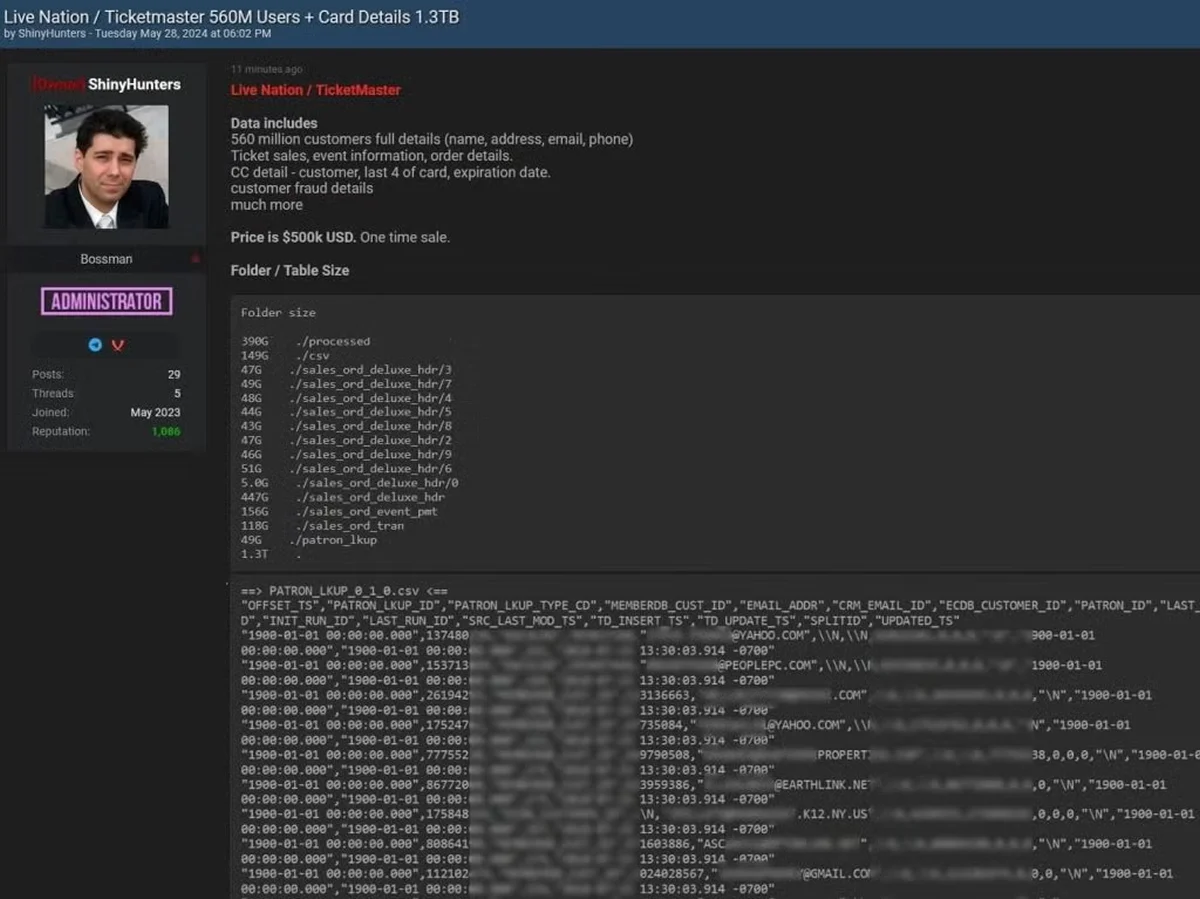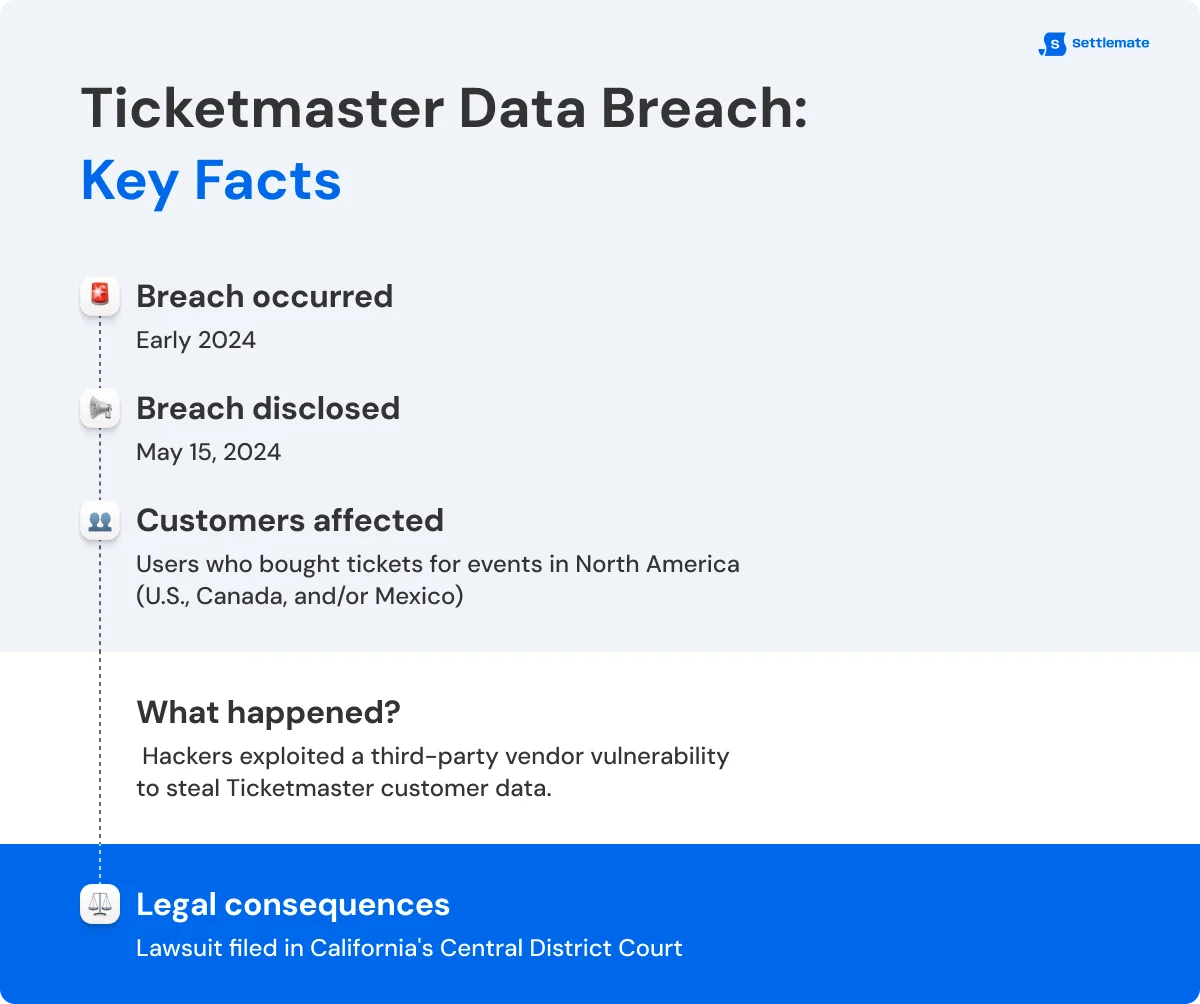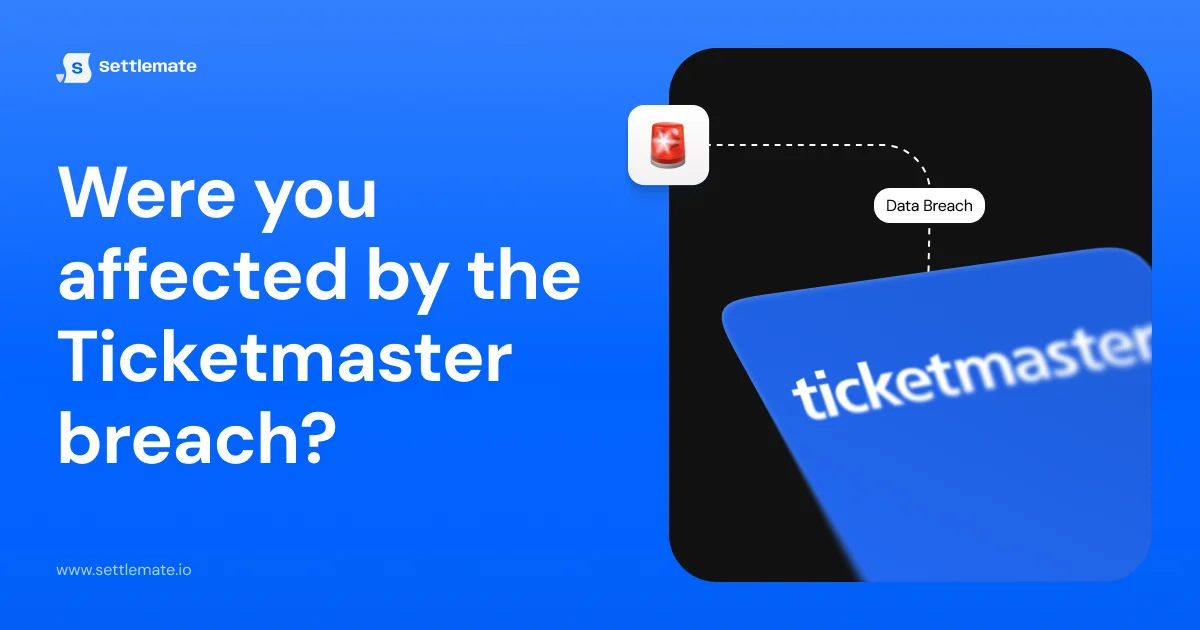You buy the ticket, mark the date, and count down the days. On concert night, you just want to feel the bass shaking the floor, sing until your throat is raw, and share that unspoken connection with thousands of fans who know every lyric by heart. Ticketmaster is supposed to be the bridge to that moment.
But in the summer of 2024, that trust was shattered. A massive breach leaked the personal information of more than 500 million customers. Suddenly, the focus shifted from refreshing pages for presale codes to refreshing bank statements for suspicious charges.
The silver lining? You're not alone. The Ticketmaster lawsuit data breach provides a way to fight back, and this guide covers what happened, who's at risk, and how to protect yourself.
Key takeaways:
- The Ticketmaster breach was massive: Hackers compromised data from more than 500 million accounts, making it one of the largest breaches ever.
- Hackers stole sensitive personal and financial data, exposing records that included names, addresses, emails, phone numbers, and partial credit card details.
- A class-action lawsuit is active in a U.S. federal court: Federal courts consolidated the Ticketmaster lawsuit data breach into a multidistrict litigation (MDL) alongside other Snowflake-related breaches.
- Compensation could include cash, credit monitoring, and fraud reimbursement: Courts have not finalized a settlement, but similar cases typically provide reimbursement for fraud losses, free credit monitoring, small cash payments for time and risk, and improved security measures by the company.
- Settlemate makes claiming compensation easy: Settlemate monitors the Ticketmaster lawsuit data breach, confirms your eligibility, pre-fills claim forms, and sends deadline reminders so you never miss your chance to collect compensation.
What actually happened in the Ticketmaster data breach?
In May 2024, Live Nation, Ticketmaster's parent company, confirmed a major data breach after hackers broke into a third-party cloud database hosted by Snowflake Inc. On May 20, Ticketmaster's IT team detected "unauthorized activity," but hackers had already done the damage.
A week later, a hacker group called ShinyHunters claimed responsibility, boasting they had stolen 1.3 terabytes of data, including customer records, and tried to sell it on the dark web for $500,000.

Cybersecurity experts believe the attackers gained access by stealing login credentials, then quietly extracted data for weeks without detection. Investigations suggest the breach may have started as early as April 2 and went unnoticed for nearly seven weeks.
On May 31, Live Nation disclosed the breach in a filing with the SEC, admitting that criminals had accessed Ticketmaster data. The company downplayed the impact, calling it "not reasonably likely" to affect their business, despite the staggering scale of the theft.
Who was affected and what data was exposed?
Hackers claim to have stolen data from 560 million Ticketmaster accounts worldwide. With Ticketmaster selling hundreds of millions of tickets a year, almost anyone who's used the platform in recent years could be affected.

What data was exposed?
Reports show the stolen information included:
- Full names
- Mailing addresses
- Email addresses
- Phone numbers
- Partial credit card numbers and expiration dates
Even partial card data paired with personal info can fuel identity theft, fraud, and phishing attacks.
Early fallout:
- Customers reported unauthorized charges, including one case of $10,000 in fraudulent charges.
- Others faced waves of phishing emails, scam texts, and account takeover attempts aimed at reselling tickets.
How many customers did hackers target?
Ticketmaster hasn't confirmed the number. Hackers claim 560 million. Independent investigations later verified that hackers compromised data from over 500 million people, with Ticketmaster holding the bulk of the stolen records.
Bottom line: if you've bought a Ticketmaster ticket in the last decade, assume your data is in the wrong hands.
Status of the Ticketmaster data breach lawsuit (U.S.)
Legal action came quickly. Within days of the breach, U.S. customers filed class-action lawsuits against Ticketmaster, Live Nation, and Snowflake, the cloud vendor.
By October 2024, these cases were merged into a single multidistrict litigation (MDL) in federal court, overseen by Judge Brian Morris in the District of Montana. The court named the consolidated case In re: Snowflake Inc. Data Security Breach Litigation.
This MDL combines lawsuits against Ticketmaster and other companies caught in the same Snowflake breach, such as AT&T and Neiman Marcus. Centralizing the cases helps streamline pretrial work and avoid duplicate proceedings.
What are the claims?
Plaintiffs, who are Ticketmaster users serving as class representatives, argue that the company:
- Failed to secure personal data
- Relied on weak security measures
- Took too long to disclose the breach
They also claim Ticketmaster violated its own privacy policy and Section 5 of the FTC Act, which requires companies to provide reasonable data protection.
How has Ticketmaster responded?
Ticketmaster and Live Nation deny wrongdoing. They filed motions to dismiss, saying they were not negligent and that the victims did not suffer measurable harm. These motions have not ended the litigation.
Where do things stand now?
The MDL is in the pretrial stage. Discovery is ongoing as lawyers review internal records to determine how the breach occurred and whether Ticketmaster's security practices fell short. Some companies in the Snowflake MDL, such as Neiman Marcus, have already reached tentative settlements in 2025. Ticketmaster and Live Nation, however, continue to fight the claims and have not agreed to any settlement.
What does this mean for users?
The Ticketmaster lawsuit data breach remains active in a U.S. federal court. Lawsuits like this often take time, especially when multiple companies are involved.
However, being aware of the litigation is crucial because if and when a settlement or judgment comes, you'll want to know if you're eligible to claim benefits. (We'll cover how to stay on top of that with Settlemate shortly.)
How to check if the breach affected you
If you are unsure whether hackers stole your data in the Ticketmaster breach, here's how to figure it out:
- Check for a notification: Ticketmaster stated it would notify affected customers by email (or postal mail) once the breach was confirmed. Indeed, Ticketmaster began sending out data breach notice letters in late June 2024 to users whose information was in the compromised database. So, search your inbox around late June or early July 2024 for any communication titled along the lines of "Notice of Data Breach" from Ticketmaster. Be sure to check spam/junk folders too.
- Look for free credit monitoring offers: In those notices, Ticketmaster provided a code for 12 months of identity protection services through TransUnion. If you received a code or instructions to sign up for credit monitoring due to Ticketmaster, that's a clear indicator you were affected.
- Review your Ticketmaster account history: Consider what information you had saved with Ticketmaster. Did you have an account with your name, address, phone, or credit card on file? If you used Ticketmaster before May 2024, hackers likely accessed your data. You can contact Ticketmaster support to inquire. They set up a hotline (1-800-653-1840) for customer questions about the breach.
- Watch for unusual activity: Keep an eye on your financial accounts and credit reports for any signs of identity theft or fraud. Unrecognized charges on the card you use for Ticketmaster, sudden spam calls/emails referencing your Ticketmaster purchases, or even someone trying to log in to your Ticketmaster account could all be fallout from the breach.
What compensation can affected customers expect?
Currently, there is no settlement or claims process open for the Ticketmaster breach in the U.S.
But if the lawsuit succeeds or settles, here's what customers may receive:
1. Reimbursement for fraud
If hackers used your information to steal money or make unauthorized charges, you may be eligible for reimbursement. Keep records of fraud, such as bank letters, fees, or other related costs. Many past data breach settlements covered out-of-pocket expenses tied to identity theft.
2. Free credit monitoring
Ticketmaster already offered one year of TransUnion credit monitoring. A settlement could extend this or add extra years of free monitoring and identity theft insurance. This is common in large breach cases (Equifax, for example, provided several years).
3. Cash payments
Even if you did not lose money, settlements sometimes offer small cash payments for time and inconvenience. These are often modest (from $25 to a few hundred dollars) and depend on the total settlement fund. With millions of victims here, payouts may be small, but a cash option is possible.
4. Identity restoration services
If criminals steal their identity, victims may access identity theft experts or insurance that covers legal and professional costs. These services give added protection and peace of mind.
5. Stronger security requirements
While not direct compensation, settlements often force companies to improve security - things like audits, stronger encryption, or new safeguards. If approved, this would prompt Ticketmaster to protect user data better in the future.
Important note
Any settlement must be approved by the court. If one happens, you will be formally notified, likely by email or mail, with clear instructions on how to file a claim.
As of September 2025, there is no official claims process. Be wary of scams or fake websites claiming otherwise. Until an official notice is issued, the best step is to stay informed and take precautions to protect your accounts.
Similar data breaches that rival Ticketmaster
The Ticketmaster data breach could be one of the largest ever, but it is not the first time millions of people have had their information exposed.
Several other high-profile breaches show just how widespread and damaging these incidents can be:
- MOVEit file transfer breach (2023): A flaw in MOVEit software allowed attackers to steal data from over 2,700 organizations, impacting about 93 million people. Like the Ticketmaster case, it involved abuse of widely used enterprise infrastructure.
- British Airways (2018): Attackers compromised a third-party vendor to steal payment card details, emails, and contact info from around 400,000 customers.
- Yahoo breaches (2013–2014): Yahoo suffered one of the largest breaches ever, with 3 billion accounts exposed in 2013 and another 500 million in 2014. Hackers gained access to names, emails, phone numbers, and security questions.
Practical steps to protect yourself after the breach
A breach this big is unsettling, but you can take clear steps to protect yourself:
- Monitor your accounts: Check bank and credit card statements regularly. Even small charges could be test transactions by fraudsters. Review PayPal, Venmo, or other linked payment apps. Report anything suspicious to your bank immediately.
- Freeze your credit or set fraud alerts: Place a free credit freeze with Experian, Equifax, and TransUnion to stop new accounts from being opened in your name. You can lift it later if needed. If you prefer, add a fraud alert so lenders must verify your identity before granting credit.
- Use free credit monitoring: Ticketmaster offered one year of TransUnion credit monitoring. If you received a code, activate it. If it has expired, contact Ticketmaster to request a new code. This service alerts you to new accounts or inquiries on your credit report.
- Update passwords and enable 2FA: Even if passwords were not exposed, change your Ticketmaster password and avoid reusing it elsewhere. Turn on two-factor authentication (2FA) for important accounts like email, banking, and social media.
- Stay alert for phishing scams: Watch for emails, texts, or calls pretending to be from Ticketmaster or your bank. Do not click links in suspicious messages, and visit the official site instead. Scammers may use your stolen data to sound convincing.

- Keep documentation: Save all related notices, emails, bank records, and reports of fraudulent activity. Keep notes about suspicious calls or charges. These records can help support future refund claims.
How Settlemate simplifies your Ticketmaster lawsuit data breach claim
Dealing with the aftermath of a breach is bad enough; chasing your compensation shouldn't add to your headaches.
This is where Settlemate comes in.
Here's how Settlemate can help you navigate the Ticketmaster data breach claims process:
- Automatic lawsuit tracking: You don't need to google for updates on the Ticketmaster lawsuit constantly. Settlemate monitors the Ticketmaster lawsuit data breach for you.
- Personalized claim matching: Settlemate's system can instantly check your eligibility for any class action settlement. You answer a few simple questions (e.g., "Did you purchase tickets through Ticketmaster before May 2024?"), and Settlemate will confirm if you're part of the affected class.
- One-click (or tap) claim filing: Perhaps the biggest pain point of claiming settlements is the paperwork. You need to complete claim forms with all your details and supporting proof. Settlemate automates that paperwork. Through the app or website, once a Ticketmaster settlement claim form is available, Settlemate can help pre-fill your information and submit the claim on your behalf in seconds.
- No lawyer or legal knowledge needed: You don't need to hire a lawyer or understand legal terms. The platform is user-friendly.
- Timely reminders and updates: Deadlines in class actions are strict. Settlemate will send you reminders before important dates, such as "Claim deadline for Ticketmaster settlement is approaching, tap here to submit."
- Secure and Confidential: Given we're talking about personal data, it's worth noting Settlemate takes privacy seriously. It's a secure platform, and your information is used only to process claims and check eligibility.
In short, once the court announces the settlement for the Ticketmaster breach, Settlemate will show you a "Ticketmaster Data Breach - Claim Your Compensation" prompt. You open the app, click a few times, file your claim, and receive confirmation. After that, you wait to collect your check or benefits.
Are you ready to stop stressing over the Ticketmaster lawsuit data breach and start turning it into compensation?
Join Settlemate today and make claiming your share simple, fast, and hassle-free.









